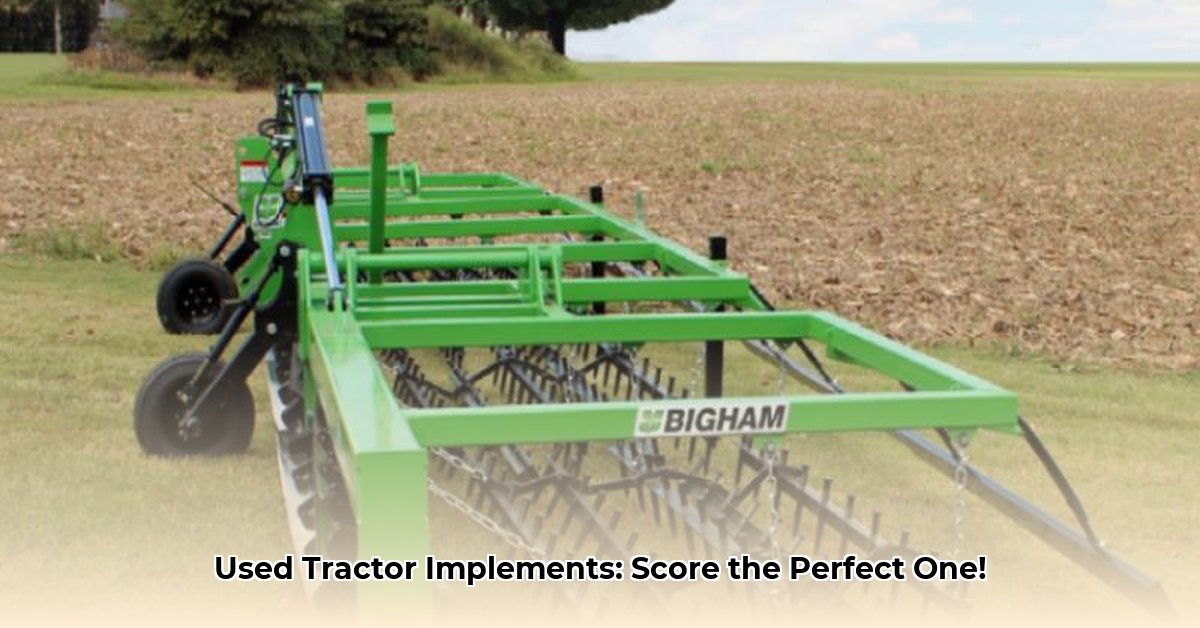
Finding a reliable used Forrest City Machine Works (FCMW) DO-ALL implement can significantly boost your farm's efficiency while saving you money. However, navigating the used equipment market requires careful planning and due diligence. This guide provides a step-by-step process for buying a used DO-ALL, ensuring you make an informed decision and avoid potential pitfalls. The closure of FCMW presents unique challenges, particularly regarding parts availability, so thorough research is paramount. For additional resources, check out this helpful used tractor site.
Pre-Purchase Research: Laying the Groundwork
Before you even consider inspecting a used DO-ALL, comprehensive research is essential. Prices for used implements vary significantly, influenced by condition, age, and location. Don't be impulsive; understand the market first.
Where to Search:
- Online Marketplaces: Websites like TractorHouse (https://www.tractorhouse.com/listings/for-sale/forrest-city-machine-works/do-all/farm-equipment) specialize in used farm equipment, often providing detailed listings and seller reviews. Regional agricultural websites and online classifieds are also excellent resources.
- Farm Auctions: Local farm auctions can offer hidden gems, but careful inspection is crucial.
- Dealer Networks: While less likely to find a used FCMW DO-ALL, contacting local equipment dealers can occasionally yield leads.
Red Flags to Watch Out For:
- Vague Descriptions: Avoid listings lacking detailed descriptions and clear photos.
- Unrealistic Prices: If a deal seems too good to be true, it probably is. Be wary of suspiciously low prices, especially compared to other similar listings.
- Reluctant Sellers: Be cautious of sellers who are resistant to questions or detailed inspections.
Data-Backed Rhetorical Question: Considering the scarcity of parts for discontinued FCMW equipment, isn't thorough pre-purchase research even more critical than usual? The answer is a resounding yes.
Inspection & Due Diligence: A Hands-On Assessment
Once you've identified potential DO-ALLs, a thorough in-person inspection is non-negotiable. This is your opportunity to assess the implement's condition and identify any potential problems before committing to a purchase.
Checklist for Inspecting a Used DO-ALL
This checklist ensures a comprehensive evaluation:
| Item | What to Check | Notes |
|---|---|---|
| Hydraulic System | Leaks, responsiveness, operating noise, condition of hoses and fittings | Thoroughly test all hydraulic functions. Smooth operation is crucial. |
| Mechanical Components | Wear, damage, smooth operation of all moving parts, shank condition | Check for play in moving parts, unusual noises, and any signs of significant wear or damage. |
| Electrical System | Functionality of lights, switches, wiring, and electrical connections | Ensure all electrical components are functioning correctly. |
| Frame & Construction | Rust, cracks, significant wear, overall structural integrity | A sturdy frame is critical. Look for any signs of weakness or damage. |
| Tires | Condition, tread depth, inflation | Worn tires can be expensive to replace; assess their condition carefully. |
| Maintenance Records | History of servicing and repairs, documentation of previous work performed | Complete and well-maintained records greatly enhance the confidence in the implement's history and maintenance. |
| Safety Features | Condition and functionality of all safety features and mechanisms | Safety is paramount. Ensure all features are functioning as designed. |
Negotiation & Purchase: Securing the Best Deal
After a thorough inspection, negotiate the price effectively. Use your research and the inspection findings to justify your offer.
Negotiation Strategies:
- Research Comparable Listings: Knowing the market value of similar DO-ALLs gives you leverage during negotiations.
- Highlight Potential Issues: Politely point out any issues uncovered during the inspection, using them to justify a lower price.
- Clarify Warranty: Discuss any warranties offered and their terms.
- Agree on Delivery: Plan transportation and associated costs upfront to avoid hidden expenses.
Quantifiable Fact: A well-negotiated price can save you hundreds, or even thousands, of dollars on your purchase.
Post-Purchase Considerations: Long-Term Maintenance
Regular maintenance is crucial for the longevity of your DO-ALL. Given FCMW's closure, parts sourcing might be challenging. Proactive maintenance minimizes the risk of costly repairs and operational downtime.
Essential Post-Purchase Steps:
- Develop a Maintenance Schedule: Establish a regular maintenance plan, including lubrication, inspections, and component replacements as needed.
- Identify Parts Suppliers: Locate reliable sources for replacement parts, perhaps through online forums, agricultural equipment repair shops, or salvage yards.
- Document Repairs: Keep detailed records of all maintenance and repairs performed.
Alternatives to Buying: Leasing or Renting
Consider leasing or renting if buying outright presents significant financial risk or if your need for the implement is temporary. These options offer more financial flexibility, but carefully weigh the cost and terms against purchasing.
Conclusion: A Well-Informed Decision
Buying a used DO-ALL requires careful planning, thorough research, and a methodical approach. By following this guide and prioritizing due diligence, you can significantly increase your chances of finding a reliable implement at a fair price. Remember: a well-informed decision leads to a successful investment in your farm's future.